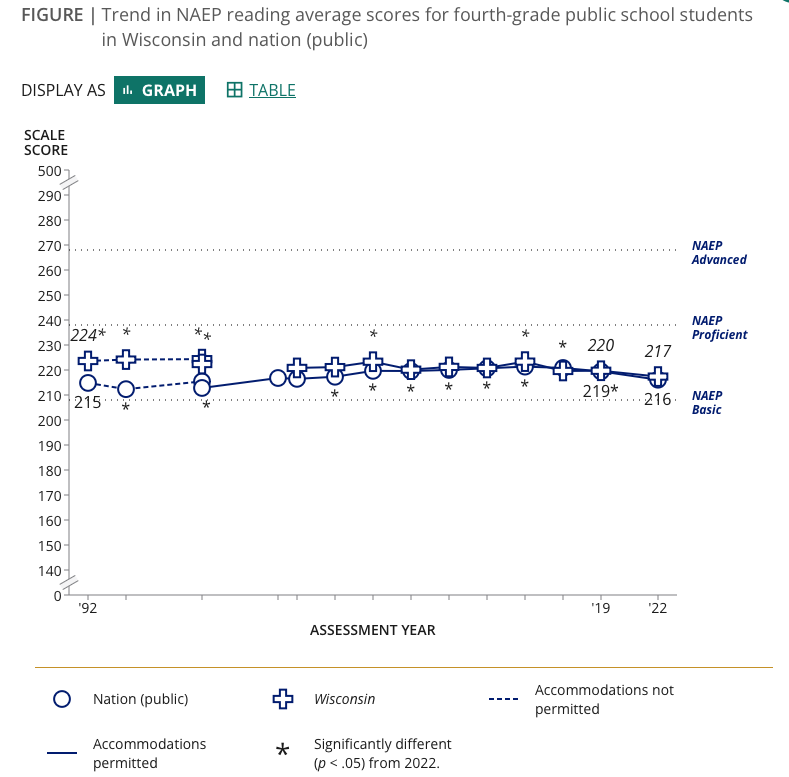Emily Hanford notes the “surge in legislative activity” amidst our long term, disastrous reading results [link].

via NAEP 4th grade results 1992-2022.
Longtime SIS readers may recall a few of these articles, bookmarking our times, so to speak:
2004: [Link]
“In 2003, 80% of Wisconsin fourth graders scored proficient or advanced on the WCKE in reading. However, in the same year only 33% of Wisconsin fourth graders reached the proficient or advanced level in reading on the NAEP.”
2005: [Link]
“According to Mr. Rainwater, the place to look for evidence of a closing achievement gap is the comparison of the percentage of African American third graders who score at the lowest level of performance on statewide tests and the percentage of other racial groups scoring at that level. He says that, after accounting for income differences, there is no gap associated with race at the lowest level of achievement in reading.”
2008: “Schools should not rely on only WKCE data to gauge progress of individual students or to determine effectiveness of programs or curriculum”
2010: When A Stands for Average: Students at the UW-Madison School of Education Receive Sky-High Grades. How Smart is That?
2010: WEAC $1.57M !! for four state senators.
2011: A Capitol Conversation:
1. How teachers are taught. In Wisconsin as in much of the US, prospective teachers are not exposed to modern research on how children develop, learn, and think. Instead, they are immersed in the views of educational theorists such as Lev Vygotsky (d. 1934) and John Dewey (d. 1952). Talented, highly motivated prospective teachers are socialized into beliefs about children that are not informed by the past 50 years of basic research in cognitive science and cognitive neuroscience.
Wisconsin adopted MTEL for elementary reading teachers only. Our version is known as the Foundations of Reading Test…
2013: Alan Borsuk:
The Massachusetts test is about to become the Wisconsin test, a step that advocates see as important to increasing the quality of reading instruction statewide and, in the long term, raising the overall reading abilities of Wisconsin students. As for those who aren’t advocates (including some who are professors in schools of education), they are going along, sometimes with a more dubious attitude to what this will prove.
2017: Foundations of Reading Test Results…
May 2013 – August 2014 (Test didn’t start until January 2014, and it was the lower cut score): 2150 pass out of 2766 first time takers = 78% passage rate .xls file
September 2014 – August 2015 (higher cut score took effect 9/14): 2173/3278 = 66%
September 2015 – August 2016: 1966/2999 = 66%
September 2016 – YTD 2017: 1680/2479 = 68%
2017 [3 minute transcript]:
2018: Wisconsin DPI efforts to weaken the Foundations of Reading Test for elementary teachers.
Also, 2018: “We set a high bar for achievement,” DPI spokesman Tom McCarthy said.
Still 2018: Alan Borsuk:
But consider a couple other things that happened in Massachusetts: Despite opposition, state officials stuck to the requirement. Teacher training programs adjusted curriculum and the percentage of students passing the test rose.
More 2018: “The data clearly indicate that being able to read is not a requirement for graduation at (Madison) East, especially if you are black or Hispanic”
2019: My Question to Wisconsin Governor Tony Evers on Teacher Mulligans and our Disastrous Reading Results.
2019, continued – Alan Borsuk:
The latest report on reading was really bad. here are some possible solutions. Mississippi got a lot of attention when the NAEP scores were released. It was the only state where fourth grade reading scores improved. Mississippi is implementing a strong requirement that teachers be well-trained in reading instruction. Massachusetts did that in the 1990s and it paid off in the following decade.
2020: Booked, but can’t read (Madison): functional literacy, National citizenship and the new face of Dred Scott in the age of mass incarceration
2021: Wisconsin DPI Superintendent Jill Underly:
All right. Um, as far as the Foundations of Reading (FORT) test is concerned, I would support eliminating it. And I’ll tell you why. I believe it’s an unnecessary hoop. Um, it makes it difficult and much harder for people to become teachers, particularly when we are already struggling. Right. With recruiting and retaining teachers.
2021: Wisconsin Governor Evers vetoes AB446 and SB454 (Friday afternoon):
The bill would mandate school boards and independent charter schools to assess the early literacy skill of pupils in four-year-old kindergarten to second grade using repeated screening assessments throughout the year and to create a personal reading plan for each pupil in five-year-old kindergarten to second grade who is identified as at-risk. It would also mandate the Department of Public Instruction establish and maintain lists of approved fundamental skills screening assessments, universal screening assessments, and diagnostic assessments on its Internet site based on alignment with model academic standards in reading and language arts, and a mandatory minimum sensitivity rate and specificity rate.
2023: Wisconsin Legislative hearing on our long term, disastrous reading results: “Well, it’s kind of too bad that we’ve got the smartest people at our universities, and yet we have to create a law to tell them how to teach.”
2023: Further attempts to kill our only teacher content knowledge requirement: elementary reading “!”. Corrinne Hess:
“Only 54 percent of first-time Teacher test takers passed for the 2020-21 school year. That’s down from 66 percent in 2014-15”
2024: Ongoing Wisconsin Literacy Legislation Litigation…. Governor Evers’ partial veto – (mind the Governor’s mulligans)
2024, continued: “Taxpayer Funded Wisconsin DPI Should Stop Playing Games with Childhood Literacy”
